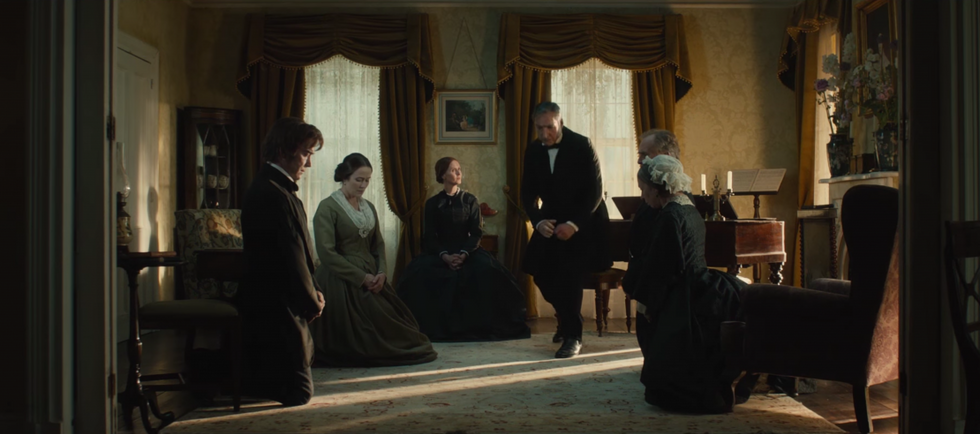'A Quiet Passion': Terence Davies on Designing Shots with Music and Poetry
Terence Davies has been making audiences invent excuses about dust in their eyes since his first short films.
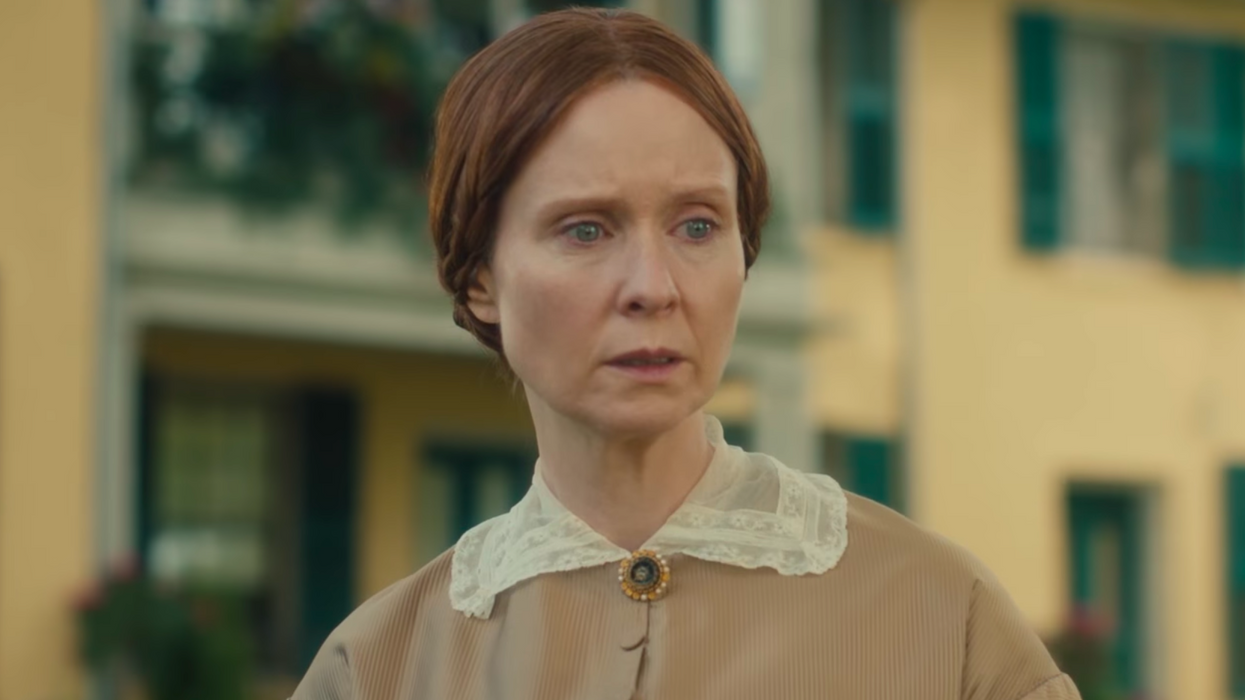
For 40 years, Terence Davies' movies have wept, swooned, and sang to audiences, who have surrendered all their emotions to him in return. His films—The Long Day Closes, The Deep Blue Sea, The House of Mirth and Distant Voices, Still Lives, toname a few—are celebrations of the emotions that make us human, the things that tear us apart inside. We hide these feelings for fear that revealing them would completely undo us.
Davies' visual language is unparalleled. No movies move or behave like his, so open and lithe. His latest, hot on the heels of his beautiful Lewis Grassic Gibbon adaption Sunset Song, released earlier this year, is A Quiet Passion, based on the life of Emily Dickinson. In the film, Dickinson (Cynthia Nixon, in what might be her best screen performance) and her family watch the Civil War break out while her career as a poet sputters. Dickinson is gifted with an ideological partner and mirror in the form of house guest Vryling Buffam (Catherine Bailey), whose revolutionary attitudes about womanhood, marriage, and religion reawaken her own long-dormant revolutionary spirit.
"Once you go into close-up or track in on someone, you're making a major statement. They're going to tell you something you didn't know."
Stylistically, the film is both typically and atypically Davies. Its painterly tableaux of the Dickinsons in their house in Amherst is classical in every sense of the word, but this film is more linear and emotionally focused than any of Davies' previous work. It feels more an actor's piece than anything he's produced in the past, allowing for long dialogue scenes between his characters.
No Film School spoke to Davies at the 2016 New York Film Festival about what he did differently this time around, how he works out the incredibly specific lighting and blocking with his cinematographer, and more. With his sonorous voice, like a fog soaked in whiskey, and the impish delight he takes in recounting his first love—the cinema—it would be possible to listen to Davies talk for hours. We had to settle for 20 minutes.
No Film School: There's a regal quality and a stateliness to the blocking and composition that's so simple and perfectly early American, like a silent film. Did silent film help you find this film's visual language?
Terence Davies: I'm not really that familiar with silent cinema. Obviously, I've seen the ones that are important—you know, Birth of a Nation and Intolerance and Greed. I think Greed is the greatest of them. I was influenced more by films like Letter from an Unknown Woman and The Heiress. And to a certain extent All About Eve and A Letter To Three Wives, which are just glorious. So you can get those influences from other places. Also, a great influence for me is the American musical. I was brought up on it. When I was six, I was taken to see Singing in the Rain. When that's your first film, you can't go wrong. It's all those influences, but I hope that they come out refracted and different.
"Sometimes we designed the shots with music or poetry to get the length and speed of a shot."
NFS: Does the language of the musical inspire the way you block or choreograph camera movements?
Davies: Well, yes, when you do things like Emily [Dickinson] coming out of the house with Vryling at the commencement ball. As they come out, the camera moves closer and closer. We could have done it in four shots, but it's a bit dull. We wanted to get the feeling of what it was like to live in Amherst. Of course, Amherst is built up now, so we did that shot in a park in Belgium. It's the material that tells you how to do it. Sometimes we designed the shots with music or poetry to get the length and speed of a shot. Sometimes I said to the actors, "This is a tracking shot; you dominate the speed of the shot." That changes it up.
Other things were slightly different. For instance, the closing sequence....I thought, "It needs something, it just needs something." And then I remembered those pieces by Charles Ives, particularly "The Unanswered Question." It's got interpolations for woodwinds. I said, "When we record it, could we take them out?" It sounds very mysterious, like it doesn't quite know where's it going. And that scene really arrived when we took out the interpolations.
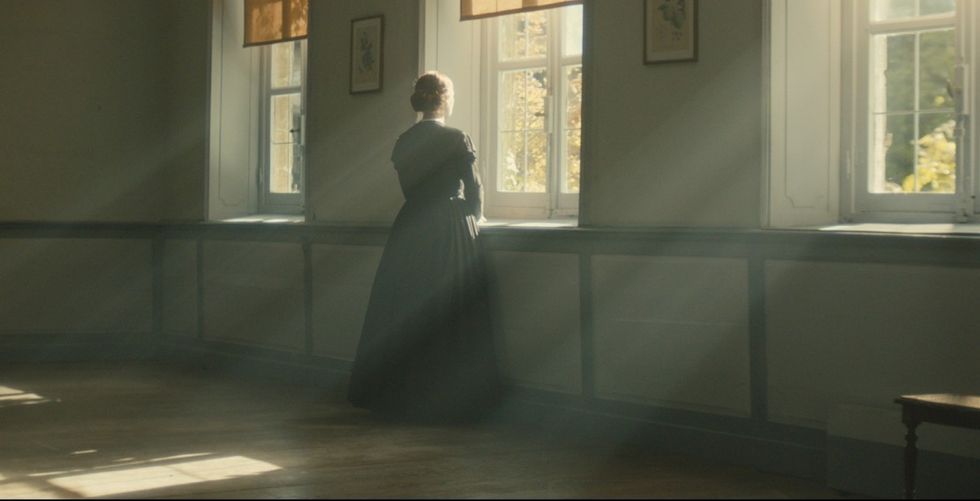
Davis: Each film has its own look. When we made Sunset Song, digital wasn't quite as good as film. That's why we shot all the exteriors on 65mm and the interiors on digital. By the time we came to do A Quiet Passion, digital was so sensitive to light, it just made sense. And all the laboritories are closing down, so you can't use film, anyway.
I discussed the look with Florian Hoffmeister, our director of photography, who is a genius. I discussed the look with all the heads of departments, and said, for instance, "There's a lot of light that pours in. It's like Shaker light. But as the film goes on, it's got to get darker and darker. The flowers have to get more and more sparse." And then once you know what it's got to look like, you trust the people who are doing it for you. Once I hire someone in the cast or on the crew, I believe in them completely.
"Once I hire someone in the cast or on the crew, I believe in them completely."
On one occasion, during [a visual realization of one of Emily's poems], the camera is supposed to track someone down the hall to the bottom of the stairs. This brilliant young lad who was doing all the flowers put this huge display under this mirror. I said, "We've got to track in on it. It's fabulous! How did you come up with it?" Because of its context, it looks like the flowers of death. Things like that, you've got to be open to.
NFS: Do you find your grammatical approach has changed during your last few films?
Davies: When I was out of work for 10 years, I don't know what happened, but I felt changed. I thought, "Why not try something new?" I couldn't just keep on doing the same thing. How can I say this in a way that will be cinematic and narratively interesting? I do feel I have more freedom, possibly because I'm less neurotic. I think the material tells you what to do. You just have to listen to it. Sometimes you get on set and say, "We don't need that. Forget it." or "Let's hold it longer."
Davies: I remember when Emily falls down for the first time and begins to shake, I didn't say cut for a very long time. You could hear people thinking, "He's either gone to sleep or he's completely lost his marbles." Florian said to me, "You're not going to use all that." And I said, "You never know!" [He laughs so hard here that he has to pause to wipe a tear away from his eye.] He's a wonderful cinematographer.
In one instance, Emily's being examined by the doctor. I said, "Let the light slowly fade." There's something so tragic about light fading on a face. It presages death, and she knows it. She absolutely knows it. Sometimes you have to stare longer than you should at a shot. What's it telling us? You have to find where the shot dies. Then you come out.
NFS: What's your rapport with Florian like on set?
Davies: We always do tests to determine what it's going to look like. As I said, I wanted that Shaker light. And then we do a few tests and see what we can do. Major shots like the 360-degree track [of Emily and her family sitting in their living room at night], I said, "Please, can it just be light from the fire and a few candles or lamps? Nothing else." And that's the way he lit it.
"If I change lenses, it's because it feels too remote."
Other times, you frame something and say, "Doesn't feel right." I never know the lenses; I can't remember the lenses, but Florian always finds the right one. He'll suggest something to me technically and I'll respond emotionally. If I change lenses, it's because it feels too remote. Even if we're in a mid or a long shot, it can still feel too remote. Sometimes, we'll set up a shot and I'll ask Florian to move a few centimeters over and he'll ask why and I'll say, "I can't tell you." It's as vague as that, I'm afraid. [Laughs]
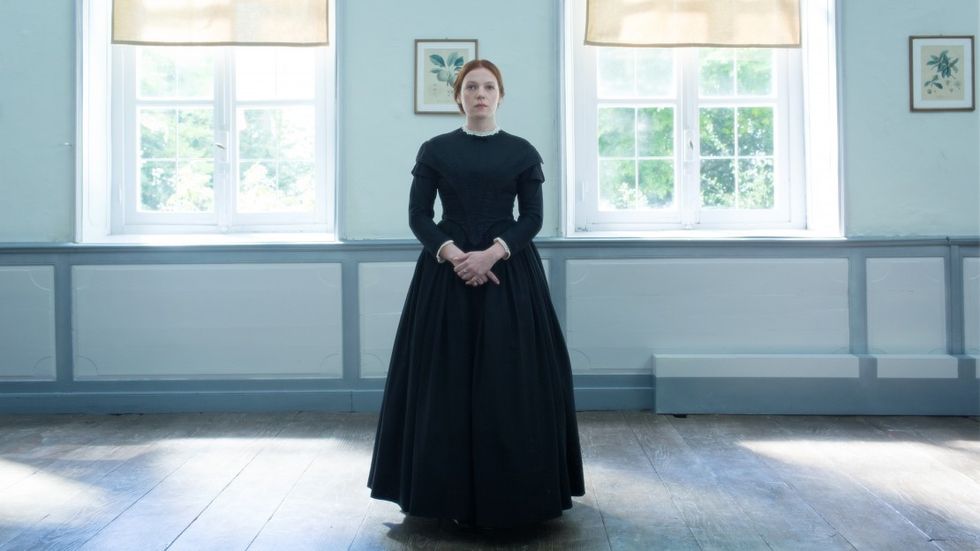
NFS: Tell me more about that remoteness. What are you trying to stay away from?
Davies: Once you go into close-up or track in on someone, you're making a major statement. They're going to tell you something you didn't know. If at the end of the track, they haven't changed what they were doing at the beginning, then all you're doing is getting closer. There's no point.
But sometimes even in close-up some lenses—and I can't tell you which numbers, because I never remember—some of them have a look, they have a feeling of just being not close enough. There's also this thing of symmetry. I tried to fight against it. I tried to get as many asymmetrical shots in there as I could, but it's hard work 'cause I'm so anally retentive about symmetry.
NFS: Symmetry is too neat?
Davies: I don't know what it is. Sometimes if [a shot] is neat, it kind of implies an ending. I want the ambiguity to be carried over. You have to do it on a shot-by-shot basis.
"Emotional honesty: You've either got it or you haven't. Cynthia [Nixon] has got it."
NFS: Cynthia Nixon and Jennifer Ehle are very different from your usual performers. Their faces are more emotive and open than your typical hero. They can't hide their emotions as well. Could you talk about the way you captured these very American performances?
Davies: I choose people who I think are right. Many of the smaller roles are done by Belgians doing wonderful American accents. The nature of the American psyche is not like Europe. And I do feel that, even now, there's a kind of formality, but below the surface is something different.
Many years ago, I was in San Francisco and I took a friend to lunch. He'd been very kind about my early work so I took him out as a gift. No one had told me that at that time in America, you tipped 15%. In England, it was 10%. So I paid, and the waitress—who, up until that point, had been very charming—slams down the check like this. [He hits the table so hard the microphone jumps to the red.] She says, "What do you call this?" I wasn't told. Beneath the surface, there's something cruel. Add to that that there was a Civil War on at the time. I don't remember which battle it was, but at point, the local gentry went out in carriages to look at it. There's something very strange about that.
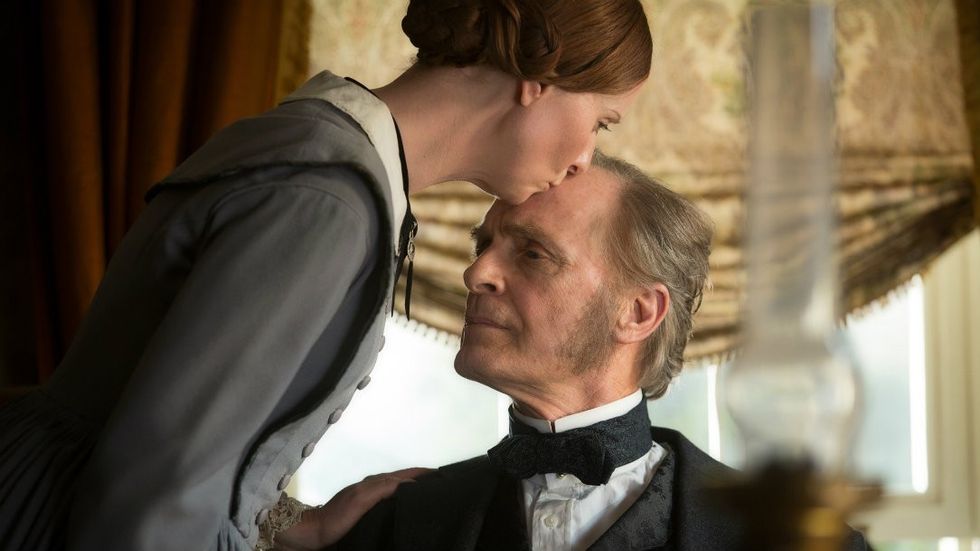
Davies: There's also—I have to say, as a counterbalance—an openness that's very touching. I wanted that openness, but it has to be emotionally honest. There's a problem today—it's not just in this country, it's all over the world—everybody cries about everything. They're happy, they cry, they're sad, they cry, they cry just to have something to do. But in those days, they were very constrained. You were not expected to do it. You were expected to behave properly.
NFS: What do you think is the most important thing your actors brought to the set?
Davies: What they all brought—but Cynthia especially—is emotional honesty. You've either got it or you haven't. Cynthia's got it. Jennifer's got it. It's always a joy to see what they do. You say, "Could you perhaps give tears?" and they say, "Very tearful or…?" I say, "No, could you fight them?"
This was the scene of the mother looking out the window. This is pure autobiography—when the light is fading in my house and it feels so desolate. I gave her that light, and I said, "When you say the first three lines, could you look out the window and then come back?" And her voice is so full of heartache, and the light is low, and the shadows lengthen, and she brings her face around—it's so heartbreaking. Because it's restrained. We did it twice in rehearsal and Keith said, "Can I hold her hand?" And I said, "Of course, you must."
